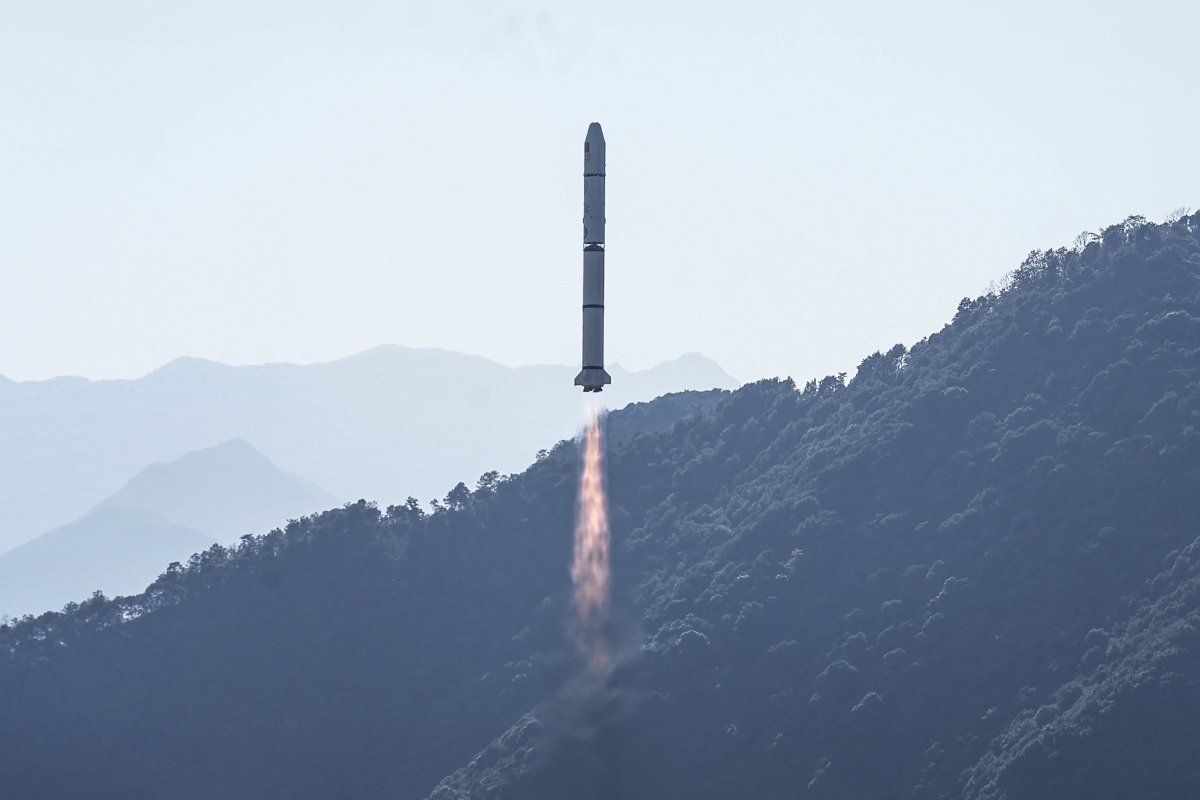Smartphones across Taiwan vibrated in unison Tuesday afternoon when the government sent out an air raid alert prompted by a Chinese rocket soaring past the island on its way into orbit.
The Mandarin Chinese message, delivered in the same manner as the government's much more common earthquake alerts, incorrectly translated the rocket's cargo—a satellite—as "missile" in English.
The alert came as Taipei prepares for its presidential and legislative elections on Saturday. Tensions between Taiwan and neighboring China are running high amid the latter's multifaceted campaign to influence the elections in its favor. The Chinese Communist Party claims the self-ruled island as its own despite never having held power there.
"China launched a satellite at 3:04 p.m. that flew over the western part of the country," the "presidential alert" issued by Taiwan's defense authorities read, urging residents to be conscious of public safety.

The alert interrupted a foreign ministry-hosted press conference in Taipei attended by Newsweek reporters concerning Beijing's election interference.
Taiwan Foreign Minister Joseph Wu said that while Chinese satellite launches over the Taiwan Strait happen from time to time, "at this sensitive moment of our election, the Chinese are still doing it. I would classify that as part of their gray zone activities."
He also cited a recent series of balloons that drifted toward the island and Chinese tow ships spotted off outlying Taiwanese islands.
He said these activities "continue to remind the people here in Taiwan that there's a danger of war between Taiwan and China."
In his New Year's Eve address, Chinese leader Xi Jinping reiterated his belief that China's unification with Taiwan was inevitable. Xi has vowed to bring this union to pass—through force if necessary. Xi made headlines last year after ordering China's People's Liberation Army to "be ready" for such an offensive by 2027.
In light of Beijing's threats, Wu said Taiwan "should be clear-eyed" and take care not to be provoked.
He wrapped up his Q&A session with the press with some advice for Beijing.
"China always likes to interfere in our democratic elections. They sometimes interfere in other countries' democratic elections," he said. "If they are so interested in playing with democratic elections, they should start doing their own democratic elections."
China-based actors have engaged in a wide variety of interference operations during this and past elections, refining their approach with subtler and more novel methods with each cycle.

Chinese officials have ominously framed the 2024 contest as choice between "peace or war" for the Taiwanese electorate. Alleged Chinese meddling ranges from offering Taiwanese officials paid trips to AI-assisted deepfakes and misinformation campaigns on social media.
However, policy analyst Frederick Tsiam of Taiwanese think tank the Institute for National Defense and Security Research questioned whether there was a connection between Tuesday's launch and the coming elections.
"Maybe it something that they already had in their schedule because they are developing the technology," he told Newsweek.
Tsiam said he didn't believe the incident would instill fear among the public.
"Instead, they will prefer to express their anger to choose a more pro-Taiwan or pro-U.S. side. I don't think people will get scared," he said.
Later on Tuesday, the defense ministry said the country's joint-intelligence, surveillance, and reconnaissance forces had monitored the situation from the launch onward. The ministry also apologized for the mistranslation, which it acknowledged had not been altered from the default air alert message.
Chinese state media released video footage and photos of the Long March-2C rocket blasting off from a launch center in the southwestern province of Sichuan.
#breaking Chinese state media releases video of satellite launch that triggered a rare nationwide emergency alert from Taiwan’s Defense Ministry — which later apologized for “missile” mistranslation. The Chinese rocket traveled over Taiwan’s airspace on its way to space. pic.twitter.com/kVota9HCTc
— Will Ripley (@willripleyCNN) January 9, 2024
"The satellite successfully entered the predetermined orbit, and the launch mission was a complete success," Chinese Central Television wrote, adding that it was the 506th launch of the Long March series of rockets.
A spokesperson for the Chinese Embassy in the U.S., Liu Pengyu, told Newsweek on Wednesday that he did not have a comment on the question of election interference, but noted the satellite in question—the Chinese Academy of Sciences-developed Einstein Probe—was tasked with "time-domain high-energy astrophysics."
"Outer space is an important field for win-win cooperation. The exploration and peaceful uses of outer space is humanity's common endeavor and should benefit all," Liu said.
The rocket "unexpectedly flew over" the 100-mile Taiwan Strait and was over southern Taiwanese airspace when it exited the Earth's atmosphere, according to a statement published by Taiwan's defense ministry that evening.
Update 1/10/24, 10:00 p.m. ET: This article was updated with comment from the Chinese Embassy in Washington, D.C.
Uncommon Knowledge
Newsweek is committed to challenging conventional wisdom and finding connections in the search for common ground.
Newsweek is committed to challenging conventional wisdom and finding connections in the search for common ground.
About the writer
Micah McCartney is a reporter for Newsweek based in Taipei, Taiwan. He covers U.S.-China relations, East Asian and Southeast Asian ... Read more
To read how Newsweek uses AI as a newsroom tool, Click here.








